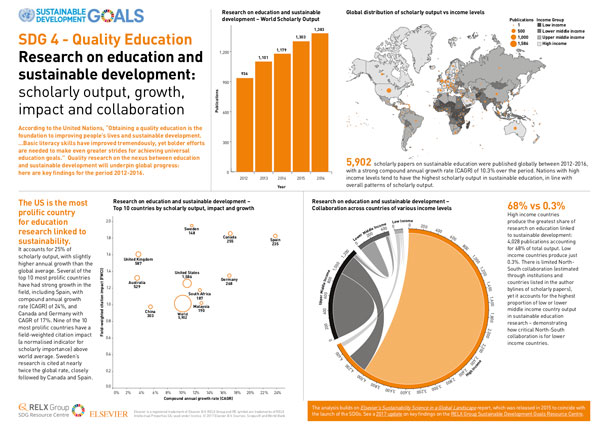Click the image to enlarge.
According to the United Nations, “Obtaining a quality education is the foundation to improving people’s lives and sustainable development. …Basic literacy skills have improved tremendously, yet bolder efforts are needed to make even greater strides for achieving universal education goals.” Quality research on the nexus between education and sustainable development will underpin global progress.
This latest analysis builds on Elsevier’s Sustainability Science in a Global Landscape Report, which was released in 2015 to coincide with the launch of the SDGs. The analysis shows, for the period 2012-2016, worldwide scholarly output for research linking education and sustainable development, and the related impact, growth and collaboration between researchers in the Global North and Global South.
Key findings from the analysis include:
- Worldwide scholarly output in the field had a strong compound annual growth rate of 10.3%
- 9 of the 10 most prolific countries (by scholarly output) produced research cited above the world average
- 68% of the output was produced by high income countries, with only 0.3% originating from low income countries
The source for the analysis is Scopus, Elsevier’s largest database of peer-reviewed literature. We took an iterative approach, conducting a keyword search to define the field, in consultation with education experts, in order to avoid restrictions to any particular subject areas aligned with the relevant corpus (in other words, we looked for research which explicitly mentions sustainability or SDG in their title, abstract or keywords). Examples of publications that were returned from the keyword search include:
- ‘An assessment of implementation of Community Oriented Primary Care in Kenyan family medicine postgraduate medical education programmes’
- ‘Adult literacy benefits? New opportunities for research into sustainable development’
- ‘Affective computing to enhance emotional sustainability of students in dropout prevention’
- ‘The transformation of traditional universities into entrepreneurial universities to ensure sustainable higher education’
- ‘Implementation of SMART teaching 3.0: Mobile-based self-directed EFL teacher professional development’
- ‘Evaluating student and instructor use of video feedback in an online learning environment’
- ‘Mobile learning as a chance to enhance education in developing countries - On the example of Ghana’
- ‘Being in the kindergarten of blended learning: Exploring teachers’ processes for sustainable blended learning practices’

